BHP Billiton: Legal Framework and International Trade Analysis
VerifiedAdded on 2023/01/05
|10
|2828
|62
Report
AI Summary
This report provides an analysis of the legal aspects affecting BHP Billiton's operations, focusing on its legislative regulatory framework and the impact of international treaties, conventions, and agreements. It examines the company's headquarters location, employee count, and industry, along with specific policies such as the Domestic Gas Policy 2006, the Australian Jobs Act 2013, and the Competition and Consumer Act 2010. The report also addresses taxation and employment laws applicable to BHP. Furthermore, it explores how various treaties, conventions, and agreements, including the agreement with the Australian Government for Iron Ore, the United Nations Framework Convention on Climate Change, the Australia New Zealand Closer Economic Relations Trade Agreement, and the agreement with the Banjima People, influence BHP's products, services, and overall business practices. The analysis highlights the legal obligations and strategic considerations that BHP must navigate to ensure compliance and sustainable operations.
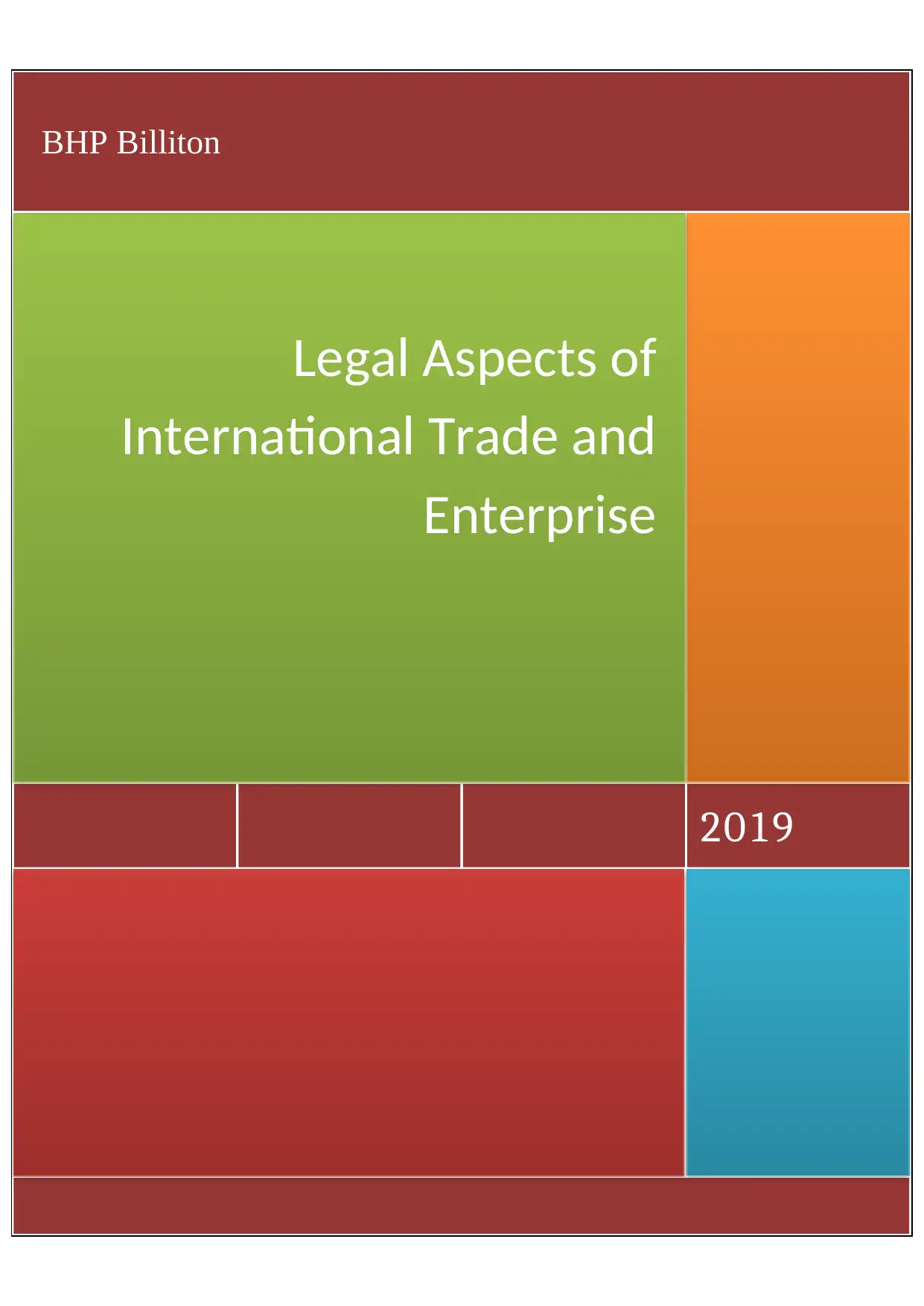
2019
Legal Aspects of
International Trade and
Enterprise
BHP Billiton
Legal Aspects of
International Trade and
Enterprise
BHP Billiton
Paraphrase This Document
Need a fresh take? Get an instant paraphrase of this document with our AI Paraphraser
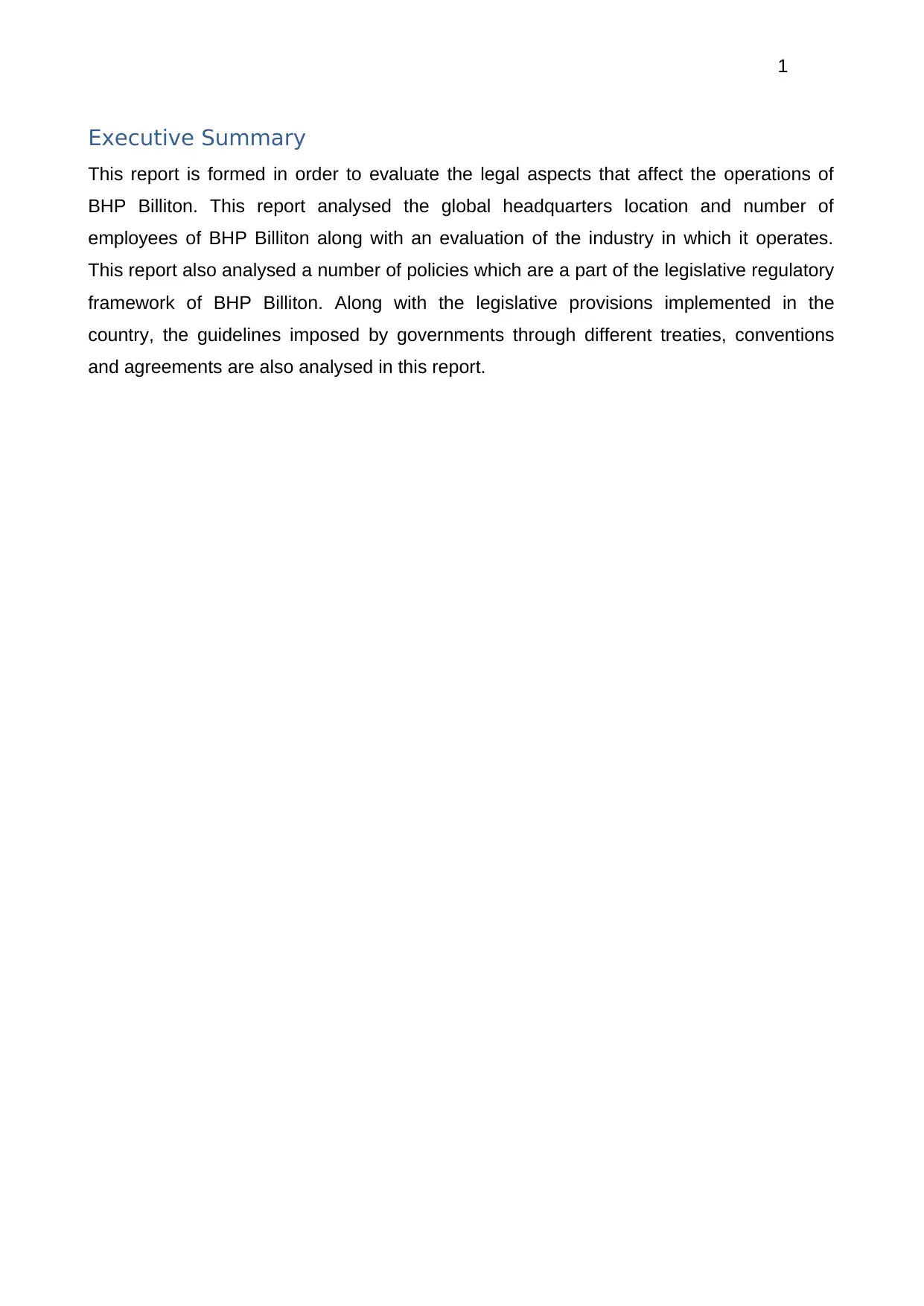
1
Executive Summary
This report is formed in order to evaluate the legal aspects that affect the operations of
BHP Billiton. This report analysed the global headquarters location and number of
employees of BHP Billiton along with an evaluation of the industry in which it operates.
This report also analysed a number of policies which are a part of the legislative regulatory
framework of BHP Billiton. Along with the legislative provisions implemented in the
country, the guidelines imposed by governments through different treaties, conventions
and agreements are also analysed in this report.
Executive Summary
This report is formed in order to evaluate the legal aspects that affect the operations of
BHP Billiton. This report analysed the global headquarters location and number of
employees of BHP Billiton along with an evaluation of the industry in which it operates.
This report also analysed a number of policies which are a part of the legislative regulatory
framework of BHP Billiton. Along with the legislative provisions implemented in the
country, the guidelines imposed by governments through different treaties, conventions
and agreements are also analysed in this report.

2
Contents
Introduction of BHP................................................................................................................3
BHP Billiton’s Legislative Regulatory Framework..................................................................3
Treaties, Conventions and Agreements................................................................................5
References.............................................................................................................................8
Contents
Introduction of BHP................................................................................................................3
BHP Billiton’s Legislative Regulatory Framework..................................................................3
Treaties, Conventions and Agreements................................................................................5
References.............................................................................................................................8
⊘ This is a preview!⊘
Do you want full access?
Subscribe today to unlock all pages.

Trusted by 1+ million students worldwide
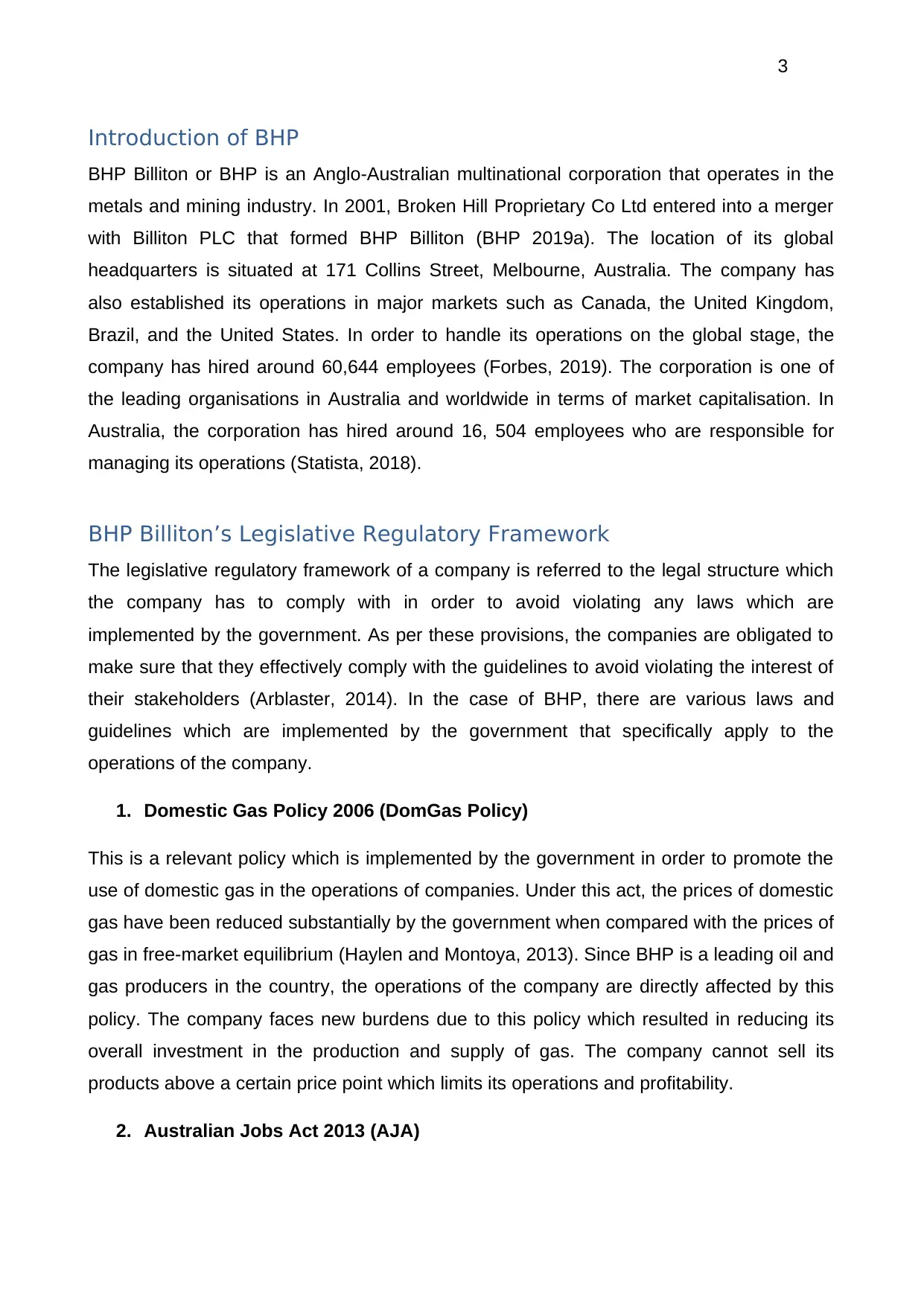
3
Introduction of BHP
BHP Billiton or BHP is an Anglo-Australian multinational corporation that operates in the
metals and mining industry. In 2001, Broken Hill Proprietary Co Ltd entered into a merger
with Billiton PLC that formed BHP Billiton (BHP 2019a). The location of its global
headquarters is situated at 171 Collins Street, Melbourne, Australia. The company has
also established its operations in major markets such as Canada, the United Kingdom,
Brazil, and the United States. In order to handle its operations on the global stage, the
company has hired around 60,644 employees (Forbes, 2019). The corporation is one of
the leading organisations in Australia and worldwide in terms of market capitalisation. In
Australia, the corporation has hired around 16, 504 employees who are responsible for
managing its operations (Statista, 2018).
BHP Billiton’s Legislative Regulatory Framework
The legislative regulatory framework of a company is referred to the legal structure which
the company has to comply with in order to avoid violating any laws which are
implemented by the government. As per these provisions, the companies are obligated to
make sure that they effectively comply with the guidelines to avoid violating the interest of
their stakeholders (Arblaster, 2014). In the case of BHP, there are various laws and
guidelines which are implemented by the government that specifically apply to the
operations of the company.
1. Domestic Gas Policy 2006 (DomGas Policy)
This is a relevant policy which is implemented by the government in order to promote the
use of domestic gas in the operations of companies. Under this act, the prices of domestic
gas have been reduced substantially by the government when compared with the prices of
gas in free-market equilibrium (Haylen and Montoya, 2013). Since BHP is a leading oil and
gas producers in the country, the operations of the company are directly affected by this
policy. The company faces new burdens due to this policy which resulted in reducing its
overall investment in the production and supply of gas. The company cannot sell its
products above a certain price point which limits its operations and profitability.
2. Australian Jobs Act 2013 (AJA)
Introduction of BHP
BHP Billiton or BHP is an Anglo-Australian multinational corporation that operates in the
metals and mining industry. In 2001, Broken Hill Proprietary Co Ltd entered into a merger
with Billiton PLC that formed BHP Billiton (BHP 2019a). The location of its global
headquarters is situated at 171 Collins Street, Melbourne, Australia. The company has
also established its operations in major markets such as Canada, the United Kingdom,
Brazil, and the United States. In order to handle its operations on the global stage, the
company has hired around 60,644 employees (Forbes, 2019). The corporation is one of
the leading organisations in Australia and worldwide in terms of market capitalisation. In
Australia, the corporation has hired around 16, 504 employees who are responsible for
managing its operations (Statista, 2018).
BHP Billiton’s Legislative Regulatory Framework
The legislative regulatory framework of a company is referred to the legal structure which
the company has to comply with in order to avoid violating any laws which are
implemented by the government. As per these provisions, the companies are obligated to
make sure that they effectively comply with the guidelines to avoid violating the interest of
their stakeholders (Arblaster, 2014). In the case of BHP, there are various laws and
guidelines which are implemented by the government that specifically apply to the
operations of the company.
1. Domestic Gas Policy 2006 (DomGas Policy)
This is a relevant policy which is implemented by the government in order to promote the
use of domestic gas in the operations of companies. Under this act, the prices of domestic
gas have been reduced substantially by the government when compared with the prices of
gas in free-market equilibrium (Haylen and Montoya, 2013). Since BHP is a leading oil and
gas producers in the country, the operations of the company are directly affected by this
policy. The company faces new burdens due to this policy which resulted in reducing its
overall investment in the production and supply of gas. The company cannot sell its
products above a certain price point which limits its operations and profitability.
2. Australian Jobs Act 2013 (AJA)
Paraphrase This Document
Need a fresh take? Get an instant paraphrase of this document with our AI Paraphraser
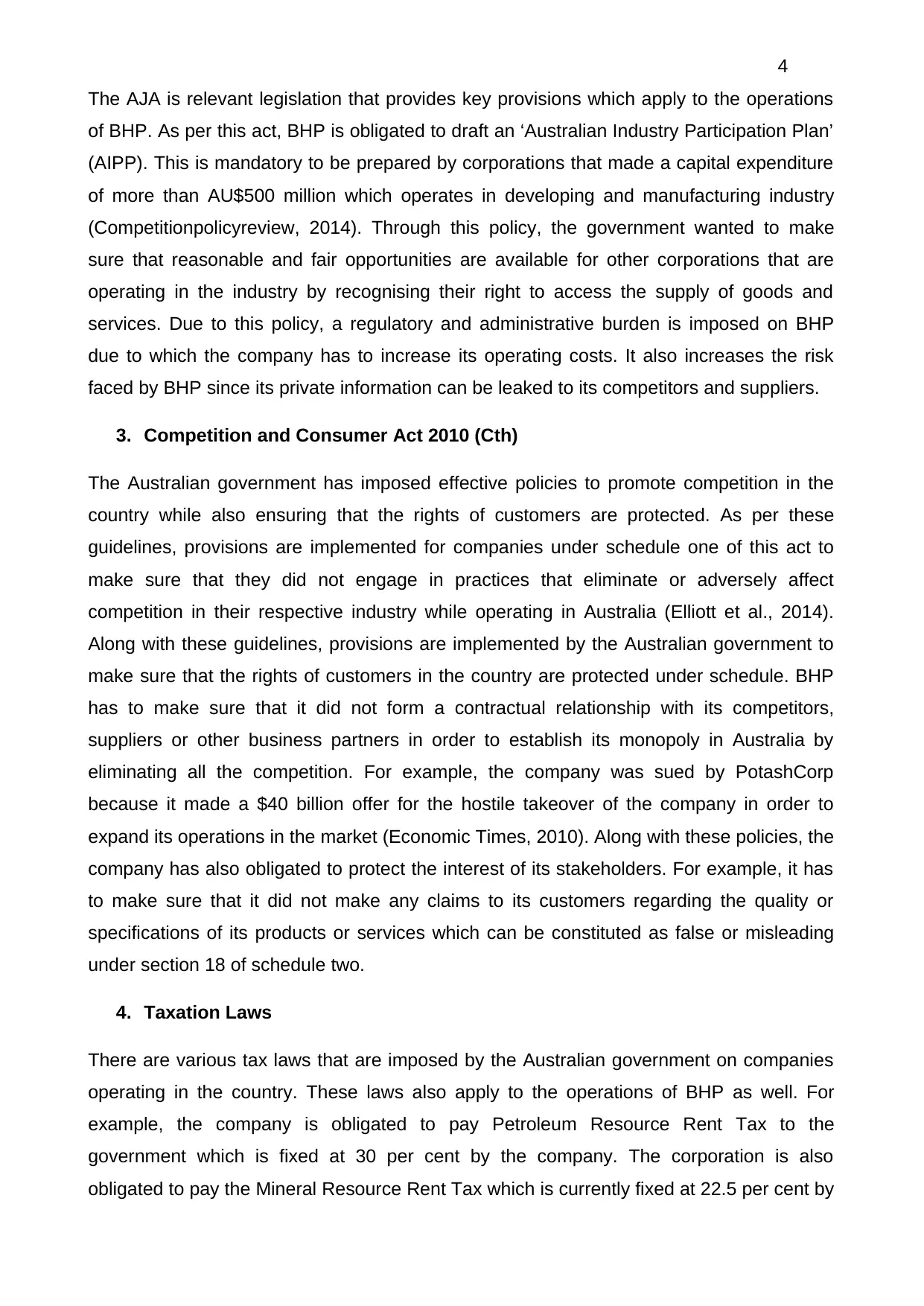
4
The AJA is relevant legislation that provides key provisions which apply to the operations
of BHP. As per this act, BHP is obligated to draft an ‘Australian Industry Participation Plan’
(AIPP). This is mandatory to be prepared by corporations that made a capital expenditure
of more than AU$500 million which operates in developing and manufacturing industry
(Competitionpolicyreview, 2014). Through this policy, the government wanted to make
sure that reasonable and fair opportunities are available for other corporations that are
operating in the industry by recognising their right to access the supply of goods and
services. Due to this policy, a regulatory and administrative burden is imposed on BHP
due to which the company has to increase its operating costs. It also increases the risk
faced by BHP since its private information can be leaked to its competitors and suppliers.
3. Competition and Consumer Act 2010 (Cth)
The Australian government has imposed effective policies to promote competition in the
country while also ensuring that the rights of customers are protected. As per these
guidelines, provisions are implemented for companies under schedule one of this act to
make sure that they did not engage in practices that eliminate or adversely affect
competition in their respective industry while operating in Australia (Elliott et al., 2014).
Along with these guidelines, provisions are implemented by the Australian government to
make sure that the rights of customers in the country are protected under schedule. BHP
has to make sure that it did not form a contractual relationship with its competitors,
suppliers or other business partners in order to establish its monopoly in Australia by
eliminating all the competition. For example, the company was sued by PotashCorp
because it made a $40 billion offer for the hostile takeover of the company in order to
expand its operations in the market (Economic Times, 2010). Along with these policies, the
company has also obligated to protect the interest of its stakeholders. For example, it has
to make sure that it did not make any claims to its customers regarding the quality or
specifications of its products or services which can be constituted as false or misleading
under section 18 of schedule two.
4. Taxation Laws
There are various tax laws that are imposed by the Australian government on companies
operating in the country. These laws also apply to the operations of BHP as well. For
example, the company is obligated to pay Petroleum Resource Rent Tax to the
government which is fixed at 30 per cent by the company. The corporation is also
obligated to pay the Mineral Resource Rent Tax which is currently fixed at 22.5 per cent by
The AJA is relevant legislation that provides key provisions which apply to the operations
of BHP. As per this act, BHP is obligated to draft an ‘Australian Industry Participation Plan’
(AIPP). This is mandatory to be prepared by corporations that made a capital expenditure
of more than AU$500 million which operates in developing and manufacturing industry
(Competitionpolicyreview, 2014). Through this policy, the government wanted to make
sure that reasonable and fair opportunities are available for other corporations that are
operating in the industry by recognising their right to access the supply of goods and
services. Due to this policy, a regulatory and administrative burden is imposed on BHP
due to which the company has to increase its operating costs. It also increases the risk
faced by BHP since its private information can be leaked to its competitors and suppliers.
3. Competition and Consumer Act 2010 (Cth)
The Australian government has imposed effective policies to promote competition in the
country while also ensuring that the rights of customers are protected. As per these
guidelines, provisions are implemented for companies under schedule one of this act to
make sure that they did not engage in practices that eliminate or adversely affect
competition in their respective industry while operating in Australia (Elliott et al., 2014).
Along with these guidelines, provisions are implemented by the Australian government to
make sure that the rights of customers in the country are protected under schedule. BHP
has to make sure that it did not form a contractual relationship with its competitors,
suppliers or other business partners in order to establish its monopoly in Australia by
eliminating all the competition. For example, the company was sued by PotashCorp
because it made a $40 billion offer for the hostile takeover of the company in order to
expand its operations in the market (Economic Times, 2010). Along with these policies, the
company has also obligated to protect the interest of its stakeholders. For example, it has
to make sure that it did not make any claims to its customers regarding the quality or
specifications of its products or services which can be constituted as false or misleading
under section 18 of schedule two.
4. Taxation Laws
There are various tax laws that are imposed by the Australian government on companies
operating in the country. These laws also apply to the operations of BHP as well. For
example, the company is obligated to pay Petroleum Resource Rent Tax to the
government which is fixed at 30 per cent by the company. The corporation is also
obligated to pay the Mineral Resource Rent Tax which is currently fixed at 22.5 per cent by
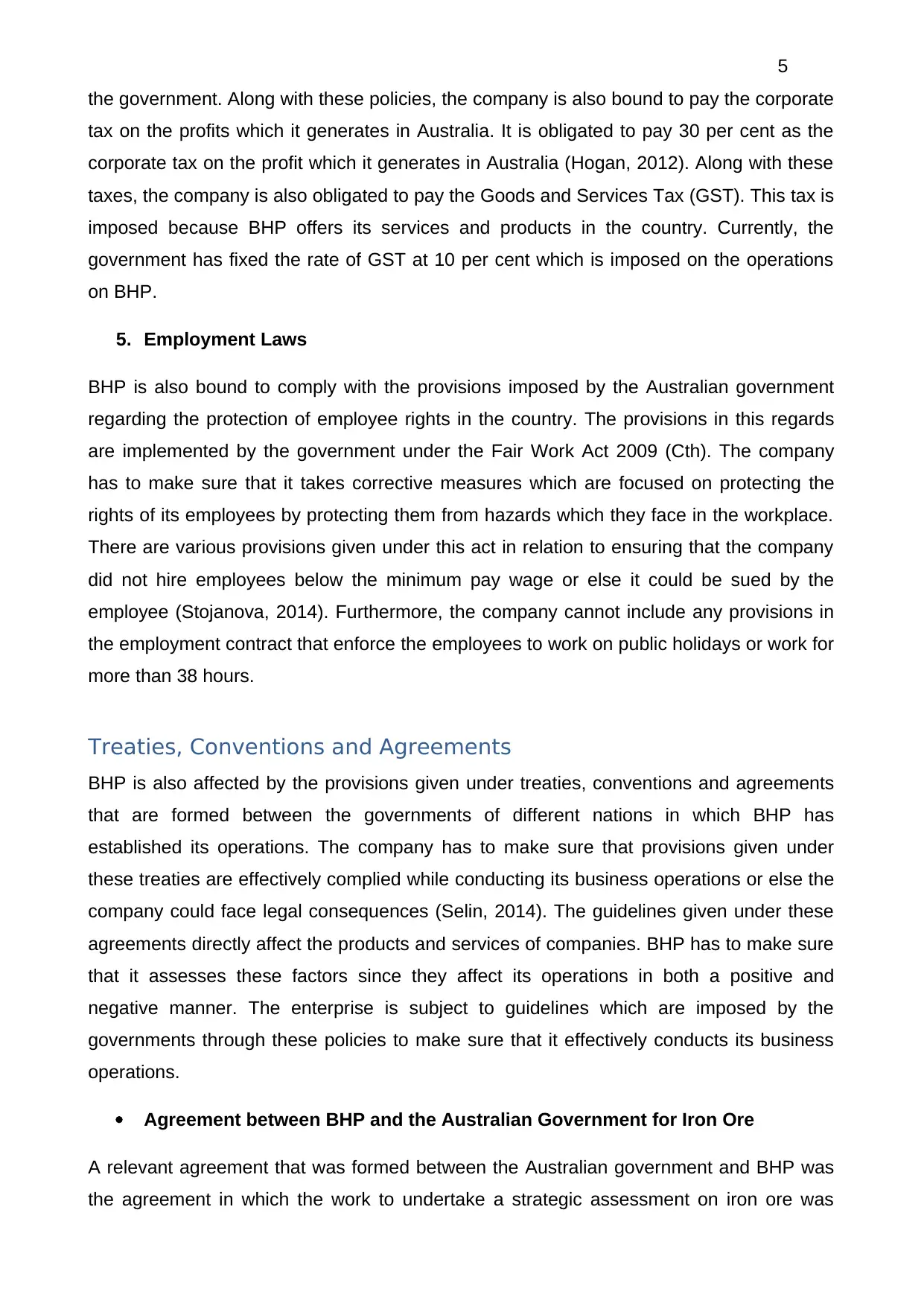
5
the government. Along with these policies, the company is also bound to pay the corporate
tax on the profits which it generates in Australia. It is obligated to pay 30 per cent as the
corporate tax on the profit which it generates in Australia (Hogan, 2012). Along with these
taxes, the company is also obligated to pay the Goods and Services Tax (GST). This tax is
imposed because BHP offers its services and products in the country. Currently, the
government has fixed the rate of GST at 10 per cent which is imposed on the operations
on BHP.
5. Employment Laws
BHP is also bound to comply with the provisions imposed by the Australian government
regarding the protection of employee rights in the country. The provisions in this regards
are implemented by the government under the Fair Work Act 2009 (Cth). The company
has to make sure that it takes corrective measures which are focused on protecting the
rights of its employees by protecting them from hazards which they face in the workplace.
There are various provisions given under this act in relation to ensuring that the company
did not hire employees below the minimum pay wage or else it could be sued by the
employee (Stojanova, 2014). Furthermore, the company cannot include any provisions in
the employment contract that enforce the employees to work on public holidays or work for
more than 38 hours.
Treaties, Conventions and Agreements
BHP is also affected by the provisions given under treaties, conventions and agreements
that are formed between the governments of different nations in which BHP has
established its operations. The company has to make sure that provisions given under
these treaties are effectively complied while conducting its business operations or else the
company could face legal consequences (Selin, 2014). The guidelines given under these
agreements directly affect the products and services of companies. BHP has to make sure
that it assesses these factors since they affect its operations in both a positive and
negative manner. The enterprise is subject to guidelines which are imposed by the
governments through these policies to make sure that it effectively conducts its business
operations.
Agreement between BHP and the Australian Government for Iron Ore
A relevant agreement that was formed between the Australian government and BHP was
the agreement in which the work to undertake a strategic assessment on iron ore was
the government. Along with these policies, the company is also bound to pay the corporate
tax on the profits which it generates in Australia. It is obligated to pay 30 per cent as the
corporate tax on the profit which it generates in Australia (Hogan, 2012). Along with these
taxes, the company is also obligated to pay the Goods and Services Tax (GST). This tax is
imposed because BHP offers its services and products in the country. Currently, the
government has fixed the rate of GST at 10 per cent which is imposed on the operations
on BHP.
5. Employment Laws
BHP is also bound to comply with the provisions imposed by the Australian government
regarding the protection of employee rights in the country. The provisions in this regards
are implemented by the government under the Fair Work Act 2009 (Cth). The company
has to make sure that it takes corrective measures which are focused on protecting the
rights of its employees by protecting them from hazards which they face in the workplace.
There are various provisions given under this act in relation to ensuring that the company
did not hire employees below the minimum pay wage or else it could be sued by the
employee (Stojanova, 2014). Furthermore, the company cannot include any provisions in
the employment contract that enforce the employees to work on public holidays or work for
more than 38 hours.
Treaties, Conventions and Agreements
BHP is also affected by the provisions given under treaties, conventions and agreements
that are formed between the governments of different nations in which BHP has
established its operations. The company has to make sure that provisions given under
these treaties are effectively complied while conducting its business operations or else the
company could face legal consequences (Selin, 2014). The guidelines given under these
agreements directly affect the products and services of companies. BHP has to make sure
that it assesses these factors since they affect its operations in both a positive and
negative manner. The enterprise is subject to guidelines which are imposed by the
governments through these policies to make sure that it effectively conducts its business
operations.
Agreement between BHP and the Australian Government for Iron Ore
A relevant agreement that was formed between the Australian government and BHP was
the agreement in which the work to undertake a strategic assessment on iron ore was
⊘ This is a preview!⊘
Do you want full access?
Subscribe today to unlock all pages.

Trusted by 1+ million students worldwide
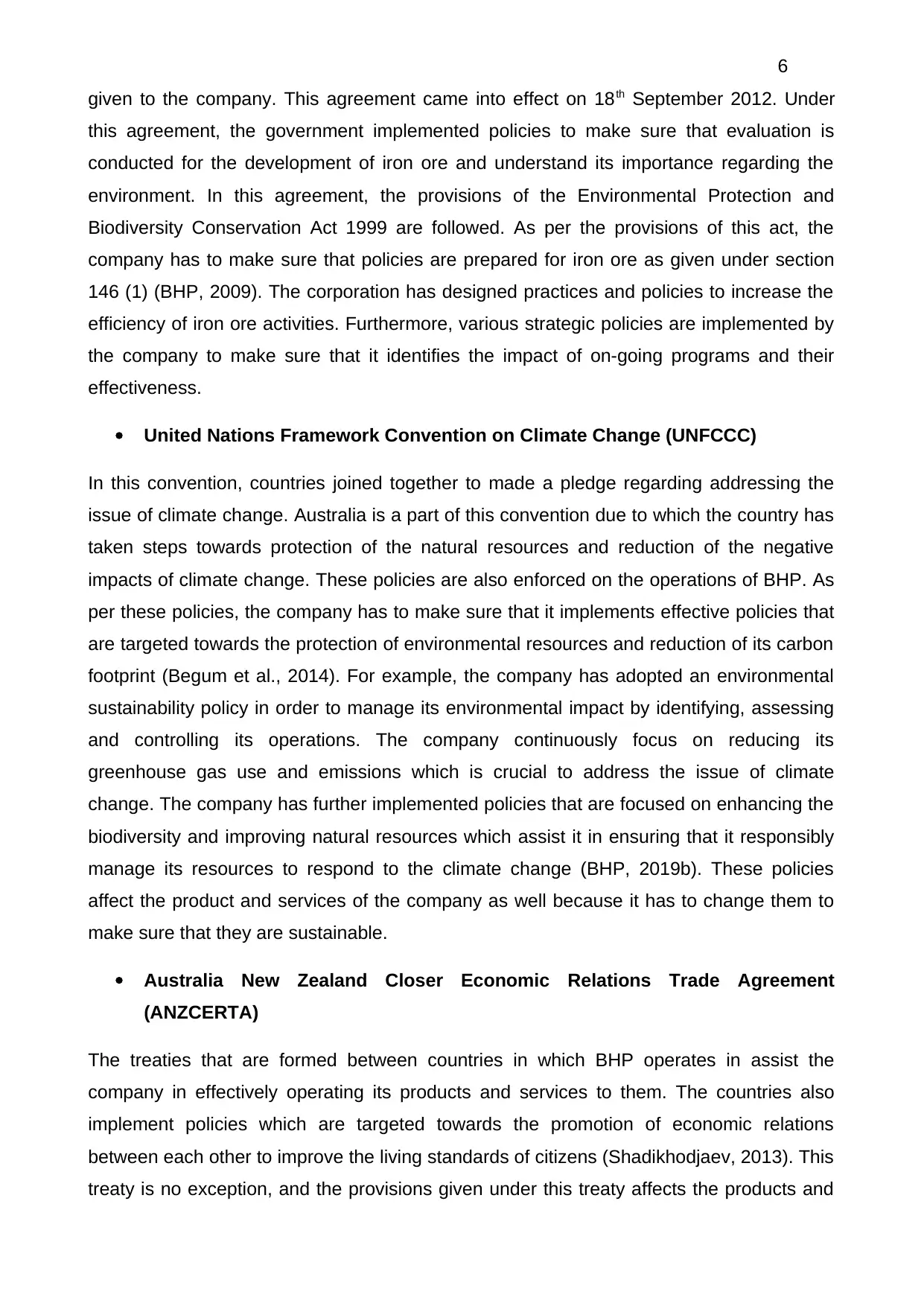
6
given to the company. This agreement came into effect on 18th September 2012. Under
this agreement, the government implemented policies to make sure that evaluation is
conducted for the development of iron ore and understand its importance regarding the
environment. In this agreement, the provisions of the Environmental Protection and
Biodiversity Conservation Act 1999 are followed. As per the provisions of this act, the
company has to make sure that policies are prepared for iron ore as given under section
146 (1) (BHP, 2009). The corporation has designed practices and policies to increase the
efficiency of iron ore activities. Furthermore, various strategic policies are implemented by
the company to make sure that it identifies the impact of on-going programs and their
effectiveness.
United Nations Framework Convention on Climate Change (UNFCCC)
In this convention, countries joined together to made a pledge regarding addressing the
issue of climate change. Australia is a part of this convention due to which the country has
taken steps towards protection of the natural resources and reduction of the negative
impacts of climate change. These policies are also enforced on the operations of BHP. As
per these policies, the company has to make sure that it implements effective policies that
are targeted towards the protection of environmental resources and reduction of its carbon
footprint (Begum et al., 2014). For example, the company has adopted an environmental
sustainability policy in order to manage its environmental impact by identifying, assessing
and controlling its operations. The company continuously focus on reducing its
greenhouse gas use and emissions which is crucial to address the issue of climate
change. The company has further implemented policies that are focused on enhancing the
biodiversity and improving natural resources which assist it in ensuring that it responsibly
manage its resources to respond to the climate change (BHP, 2019b). These policies
affect the product and services of the company as well because it has to change them to
make sure that they are sustainable.
Australia New Zealand Closer Economic Relations Trade Agreement
(ANZCERTA)
The treaties that are formed between countries in which BHP operates in assist the
company in effectively operating its products and services to them. The countries also
implement policies which are targeted towards the promotion of economic relations
between each other to improve the living standards of citizens (Shadikhodjaev, 2013). This
treaty is no exception, and the provisions given under this treaty affects the products and
given to the company. This agreement came into effect on 18th September 2012. Under
this agreement, the government implemented policies to make sure that evaluation is
conducted for the development of iron ore and understand its importance regarding the
environment. In this agreement, the provisions of the Environmental Protection and
Biodiversity Conservation Act 1999 are followed. As per the provisions of this act, the
company has to make sure that policies are prepared for iron ore as given under section
146 (1) (BHP, 2009). The corporation has designed practices and policies to increase the
efficiency of iron ore activities. Furthermore, various strategic policies are implemented by
the company to make sure that it identifies the impact of on-going programs and their
effectiveness.
United Nations Framework Convention on Climate Change (UNFCCC)
In this convention, countries joined together to made a pledge regarding addressing the
issue of climate change. Australia is a part of this convention due to which the country has
taken steps towards protection of the natural resources and reduction of the negative
impacts of climate change. These policies are also enforced on the operations of BHP. As
per these policies, the company has to make sure that it implements effective policies that
are targeted towards the protection of environmental resources and reduction of its carbon
footprint (Begum et al., 2014). For example, the company has adopted an environmental
sustainability policy in order to manage its environmental impact by identifying, assessing
and controlling its operations. The company continuously focus on reducing its
greenhouse gas use and emissions which is crucial to address the issue of climate
change. The company has further implemented policies that are focused on enhancing the
biodiversity and improving natural resources which assist it in ensuring that it responsibly
manage its resources to respond to the climate change (BHP, 2019b). These policies
affect the product and services of the company as well because it has to change them to
make sure that they are sustainable.
Australia New Zealand Closer Economic Relations Trade Agreement
(ANZCERTA)
The treaties that are formed between countries in which BHP operates in assist the
company in effectively operating its products and services to them. The countries also
implement policies which are targeted towards the promotion of economic relations
between each other to improve the living standards of citizens (Shadikhodjaev, 2013). This
treaty is no exception, and the provisions given under this treaty affects the products and
Paraphrase This Document
Need a fresh take? Get an instant paraphrase of this document with our AI Paraphraser
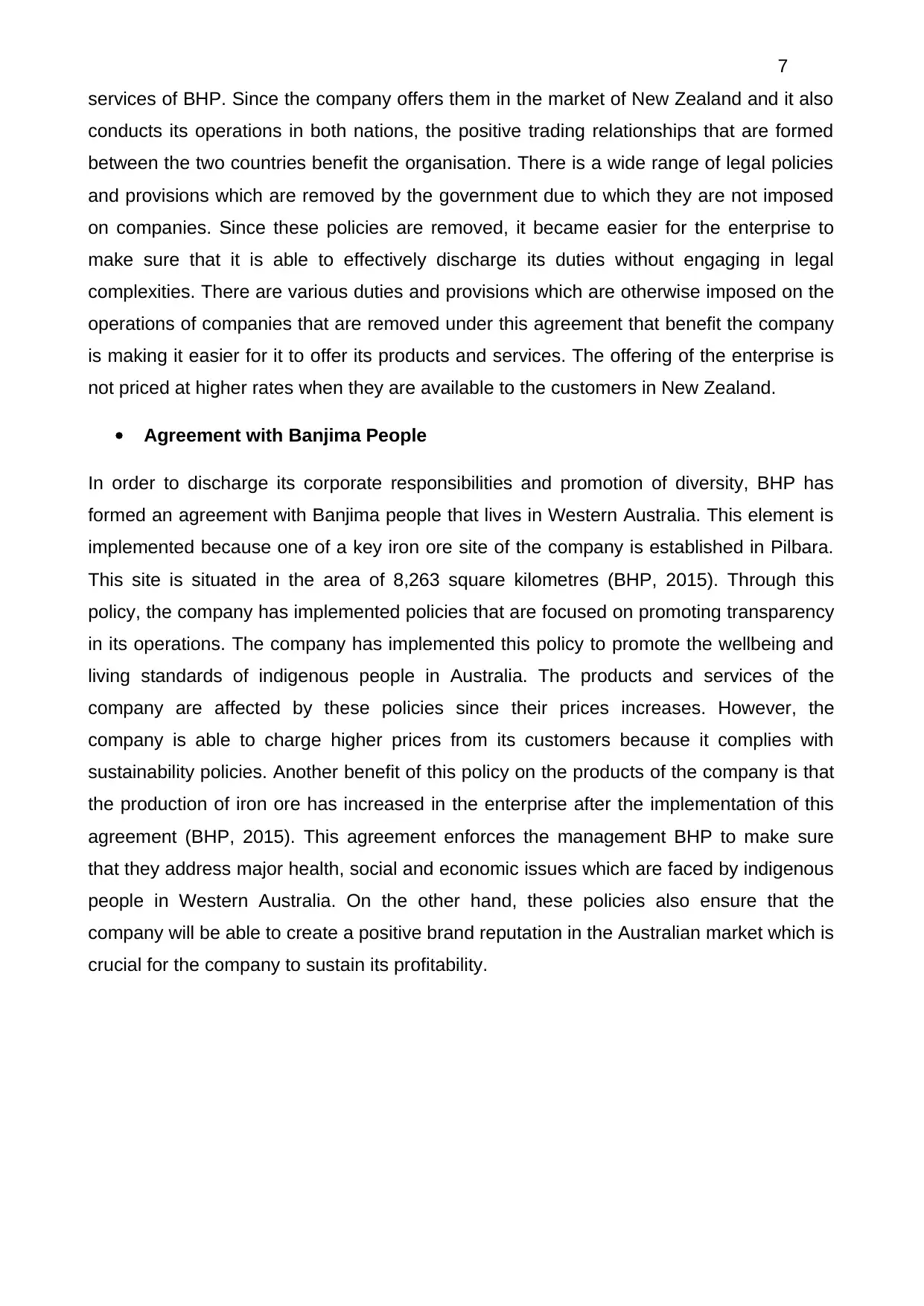
7
services of BHP. Since the company offers them in the market of New Zealand and it also
conducts its operations in both nations, the positive trading relationships that are formed
between the two countries benefit the organisation. There is a wide range of legal policies
and provisions which are removed by the government due to which they are not imposed
on companies. Since these policies are removed, it became easier for the enterprise to
make sure that it is able to effectively discharge its duties without engaging in legal
complexities. There are various duties and provisions which are otherwise imposed on the
operations of companies that are removed under this agreement that benefit the company
is making it easier for it to offer its products and services. The offering of the enterprise is
not priced at higher rates when they are available to the customers in New Zealand.
Agreement with Banjima People
In order to discharge its corporate responsibilities and promotion of diversity, BHP has
formed an agreement with Banjima people that lives in Western Australia. This element is
implemented because one of a key iron ore site of the company is established in Pilbara.
This site is situated in the area of 8,263 square kilometres (BHP, 2015). Through this
policy, the company has implemented policies that are focused on promoting transparency
in its operations. The company has implemented this policy to promote the wellbeing and
living standards of indigenous people in Australia. The products and services of the
company are affected by these policies since their prices increases. However, the
company is able to charge higher prices from its customers because it complies with
sustainability policies. Another benefit of this policy on the products of the company is that
the production of iron ore has increased in the enterprise after the implementation of this
agreement (BHP, 2015). This agreement enforces the management BHP to make sure
that they address major health, social and economic issues which are faced by indigenous
people in Western Australia. On the other hand, these policies also ensure that the
company will be able to create a positive brand reputation in the Australian market which is
crucial for the company to sustain its profitability.
services of BHP. Since the company offers them in the market of New Zealand and it also
conducts its operations in both nations, the positive trading relationships that are formed
between the two countries benefit the organisation. There is a wide range of legal policies
and provisions which are removed by the government due to which they are not imposed
on companies. Since these policies are removed, it became easier for the enterprise to
make sure that it is able to effectively discharge its duties without engaging in legal
complexities. There are various duties and provisions which are otherwise imposed on the
operations of companies that are removed under this agreement that benefit the company
is making it easier for it to offer its products and services. The offering of the enterprise is
not priced at higher rates when they are available to the customers in New Zealand.
Agreement with Banjima People
In order to discharge its corporate responsibilities and promotion of diversity, BHP has
formed an agreement with Banjima people that lives in Western Australia. This element is
implemented because one of a key iron ore site of the company is established in Pilbara.
This site is situated in the area of 8,263 square kilometres (BHP, 2015). Through this
policy, the company has implemented policies that are focused on promoting transparency
in its operations. The company has implemented this policy to promote the wellbeing and
living standards of indigenous people in Australia. The products and services of the
company are affected by these policies since their prices increases. However, the
company is able to charge higher prices from its customers because it complies with
sustainability policies. Another benefit of this policy on the products of the company is that
the production of iron ore has increased in the enterprise after the implementation of this
agreement (BHP, 2015). This agreement enforces the management BHP to make sure
that they address major health, social and economic issues which are faced by indigenous
people in Western Australia. On the other hand, these policies also ensure that the
company will be able to create a positive brand reputation in the Australian market which is
crucial for the company to sustain its profitability.
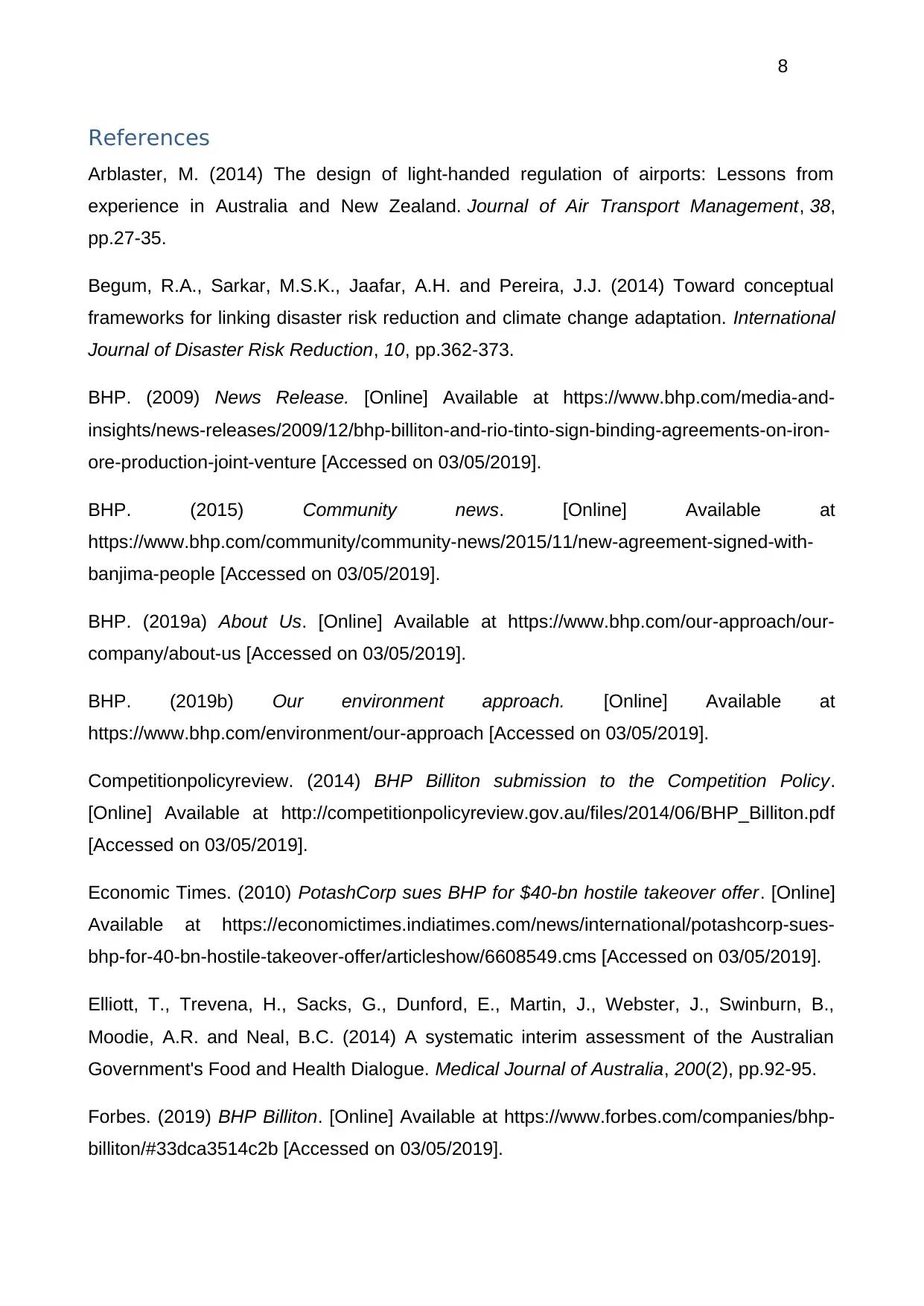
8
References
Arblaster, M. (2014) The design of light-handed regulation of airports: Lessons from
experience in Australia and New Zealand. Journal of Air Transport Management, 38,
pp.27-35.
Begum, R.A., Sarkar, M.S.K., Jaafar, A.H. and Pereira, J.J. (2014) Toward conceptual
frameworks for linking disaster risk reduction and climate change adaptation. International
Journal of Disaster Risk Reduction, 10, pp.362-373.
BHP. (2009) News Release. [Online] Available at https://www.bhp.com/media-and-
insights/news-releases/2009/12/bhp-billiton-and-rio-tinto-sign-binding-agreements-on-iron-
ore-production-joint-venture [Accessed on 03/05/2019].
BHP. (2015) Community news. [Online] Available at
https://www.bhp.com/community/community-news/2015/11/new-agreement-signed-with-
banjima-people [Accessed on 03/05/2019].
BHP. (2019a) About Us. [Online] Available at https://www.bhp.com/our-approach/our-
company/about-us [Accessed on 03/05/2019].
BHP. (2019b) Our environment approach. [Online] Available at
https://www.bhp.com/environment/our-approach [Accessed on 03/05/2019].
Competitionpolicyreview. (2014) BHP Billiton submission to the Competition Policy.
[Online] Available at http://competitionpolicyreview.gov.au/files/2014/06/BHP_Billiton.pdf
[Accessed on 03/05/2019].
Economic Times. (2010) PotashCorp sues BHP for $40-bn hostile takeover offer. [Online]
Available at https://economictimes.indiatimes.com/news/international/potashcorp-sues-
bhp-for-40-bn-hostile-takeover-offer/articleshow/6608549.cms [Accessed on 03/05/2019].
Elliott, T., Trevena, H., Sacks, G., Dunford, E., Martin, J., Webster, J., Swinburn, B.,
Moodie, A.R. and Neal, B.C. (2014) A systematic interim assessment of the Australian
Government's Food and Health Dialogue. Medical Journal of Australia, 200(2), pp.92-95.
Forbes. (2019) BHP Billiton. [Online] Available at https://www.forbes.com/companies/bhp-
billiton/#33dca3514c2b [Accessed on 03/05/2019].
References
Arblaster, M. (2014) The design of light-handed regulation of airports: Lessons from
experience in Australia and New Zealand. Journal of Air Transport Management, 38,
pp.27-35.
Begum, R.A., Sarkar, M.S.K., Jaafar, A.H. and Pereira, J.J. (2014) Toward conceptual
frameworks for linking disaster risk reduction and climate change adaptation. International
Journal of Disaster Risk Reduction, 10, pp.362-373.
BHP. (2009) News Release. [Online] Available at https://www.bhp.com/media-and-
insights/news-releases/2009/12/bhp-billiton-and-rio-tinto-sign-binding-agreements-on-iron-
ore-production-joint-venture [Accessed on 03/05/2019].
BHP. (2015) Community news. [Online] Available at
https://www.bhp.com/community/community-news/2015/11/new-agreement-signed-with-
banjima-people [Accessed on 03/05/2019].
BHP. (2019a) About Us. [Online] Available at https://www.bhp.com/our-approach/our-
company/about-us [Accessed on 03/05/2019].
BHP. (2019b) Our environment approach. [Online] Available at
https://www.bhp.com/environment/our-approach [Accessed on 03/05/2019].
Competitionpolicyreview. (2014) BHP Billiton submission to the Competition Policy.
[Online] Available at http://competitionpolicyreview.gov.au/files/2014/06/BHP_Billiton.pdf
[Accessed on 03/05/2019].
Economic Times. (2010) PotashCorp sues BHP for $40-bn hostile takeover offer. [Online]
Available at https://economictimes.indiatimes.com/news/international/potashcorp-sues-
bhp-for-40-bn-hostile-takeover-offer/articleshow/6608549.cms [Accessed on 03/05/2019].
Elliott, T., Trevena, H., Sacks, G., Dunford, E., Martin, J., Webster, J., Swinburn, B.,
Moodie, A.R. and Neal, B.C. (2014) A systematic interim assessment of the Australian
Government's Food and Health Dialogue. Medical Journal of Australia, 200(2), pp.92-95.
Forbes. (2019) BHP Billiton. [Online] Available at https://www.forbes.com/companies/bhp-
billiton/#33dca3514c2b [Accessed on 03/05/2019].
⊘ This is a preview!⊘
Do you want full access?
Subscribe today to unlock all pages.

Trusted by 1+ million students worldwide
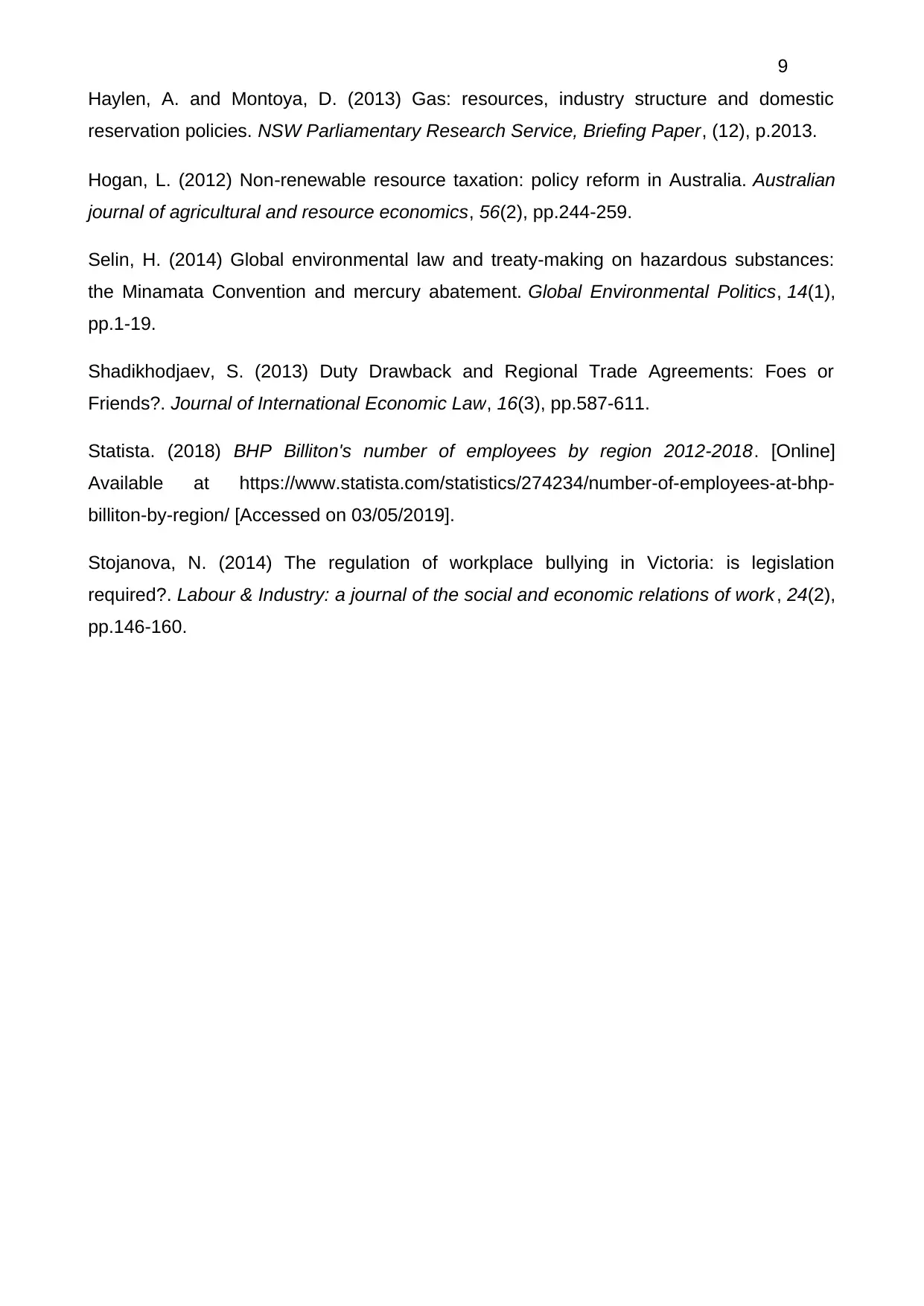
9
Haylen, A. and Montoya, D. (2013) Gas: resources, industry structure and domestic
reservation policies. NSW Parliamentary Research Service, Briefing Paper, (12), p.2013.
Hogan, L. (2012) Non‐renewable resource taxation: policy reform in Australia. Australian
journal of agricultural and resource economics, 56(2), pp.244-259.
Selin, H. (2014) Global environmental law and treaty-making on hazardous substances:
the Minamata Convention and mercury abatement. Global Environmental Politics, 14(1),
pp.1-19.
Shadikhodjaev, S. (2013) Duty Drawback and Regional Trade Agreements: Foes or
Friends?. Journal of International Economic Law, 16(3), pp.587-611.
Statista. (2018) BHP Billiton's number of employees by region 2012-2018. [Online]
Available at https://www.statista.com/statistics/274234/number-of-employees-at-bhp-
billiton-by-region/ [Accessed on 03/05/2019].
Stojanova, N. (2014) The regulation of workplace bullying in Victoria: is legislation
required?. Labour & Industry: a journal of the social and economic relations of work , 24(2),
pp.146-160.
Haylen, A. and Montoya, D. (2013) Gas: resources, industry structure and domestic
reservation policies. NSW Parliamentary Research Service, Briefing Paper, (12), p.2013.
Hogan, L. (2012) Non‐renewable resource taxation: policy reform in Australia. Australian
journal of agricultural and resource economics, 56(2), pp.244-259.
Selin, H. (2014) Global environmental law and treaty-making on hazardous substances:
the Minamata Convention and mercury abatement. Global Environmental Politics, 14(1),
pp.1-19.
Shadikhodjaev, S. (2013) Duty Drawback and Regional Trade Agreements: Foes or
Friends?. Journal of International Economic Law, 16(3), pp.587-611.
Statista. (2018) BHP Billiton's number of employees by region 2012-2018. [Online]
Available at https://www.statista.com/statistics/274234/number-of-employees-at-bhp-
billiton-by-region/ [Accessed on 03/05/2019].
Stojanova, N. (2014) The regulation of workplace bullying in Victoria: is legislation
required?. Labour & Industry: a journal of the social and economic relations of work , 24(2),
pp.146-160.
1 out of 10
Related Documents
Your All-in-One AI-Powered Toolkit for Academic Success.
+13062052269
info@desklib.com
Available 24*7 on WhatsApp / Email
![[object Object]](/_next/static/media/star-bottom.7253800d.svg)
Unlock your academic potential
Copyright © 2020–2026 A2Z Services. All Rights Reserved. Developed and managed by ZUCOL.




